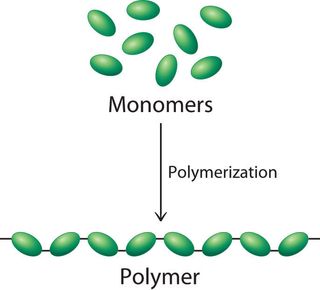Comprehending Polymers: The Science Behind Versatile Materials
Comprehending Polymers: The Science Behind Versatile Materials
Blog Article
Discovering the Varied Applications and Advantages of Polymers in Different Industries
Polymers, with their diverse array of properties and capabilities, have become essential in various markets, each enjoying distinct gain from their application. Polymers. From enhancing safety and performance in the auto industry to transforming clinical gadgets in the health care industry, polymers play a crucial duty. Their environment-friendly nature is altering the landscape of sustainability methods. As we explore the depths of polymers in electronics, we reveal innovative advancements, while their architectural integrity changes the realm of building and infrastructure. The prevalent impact of polymers across industries is a testimony to their adaptability and versatility, shaping the future of plenty of sectors.
Automotive Industry Applications
Polymers play a critical duty in boosting the efficiency and sturdiness of numerous elements within the vehicle sector. One prominent use of polymers in the automotive sector is in the production of light-weight components.

Health Care Sector Benefits
In various medical care applications, the benefits of making use of polymers are widely recognized for their varied variety of helpful buildings. Polymers play a critical duty in the health care market because of their adaptability, biocompatibility, and cost-effectiveness. Among the key advantages of polymers in medical care is their capability to be tailored to certain needs, such as adaptability, longevity, and biodegradability, making them excellent for a large range of medical applications.
Polymer-based materials are thoroughly used in medical devices, such as catheters, implants, prosthetics, and medication distribution systems, because of their biocompatibility and ability to imitate all-natural tissues. These materials can minimize the threat of allergic responses or rejections, boosting patient safety and security and results. Additionally, polymers are lightweight, making them appropriate for wearable clinical gadgets and ensuring individual comfort.
In addition, polymers enable the development of innovative therapy approaches, such as hydrogels for cells design and nanocomposites for targeted medication shipment. Their convenience of handling and sanitation makes them essential for keeping high requirements of YOURURL.com health in health care setups. In general, the varied advantages of polymers add significantly to advancements in medical technology and person treatment.
Environmental Benefits of Polymers

Furthermore, polymers can add to power cost savings because of their lightweight nature. In sectors such as transportation, light-weight polymer products can assist minimize fuel consumption and greenhouse gas discharges. Furthermore, polymers can allow the development of energy-efficient products such as insulation materials that enhance energy conservation in buildings.
Additionally, polymers play an important duty in lowering water pollution. For instance, the usage of polymer-based filtration systems can successfully remove contaminants and pollutants from wastewater, protecting water sources and ecological communities. Overall, the environmental benefits of polymers make them beneficial possessions in advertising sustainability and environmentally friendly methods throughout various sectors.
Polymers in Electronic Devices and Modern Technology
Thinking about the increasing demand for innovative and sustainable services in modern-day markets, the combination of sophisticated polymer modern technologies in the world of electronics and technology has become a pivotal method for driving performance and performance. Polymers have actually reinvented the electronic devices sector by enabling the production of lighter, extra flexible, and long lasting electronic tools. From mobile phones to medical devices, polymers play an essential function in boosting product layout and capability.
One substantial benefit of polymers in electronics is their insulating residential properties, which help secure fragile electronic parts from ecological aspects and electric disturbance. Additionally, polymers are essential in the development of flexible screens, wearable modern technology, and published electronics, offering endless possibilities for developing smart and interconnected gadgets.
Moreover, making use of polymers in electronic packaging has caused advancements in miniaturization here are the findings and thermal management, improving the overall performance and reliability of digital systems. As modern technology continues to evolve, the flexibility and flexibility of polymers will definitely drive even more technology in the electronic devices sector, shaping the future of technology.
Role of Polymers in Construction and Facilities
The combination of innovative polymer materials in construction and facilities projects has actually reinvented the method frameworks are developed and constructed in modern-day times. Polymers provide many advantages in the building and construction market due to their convenience, sturdiness, and cost-effectiveness. One vital duty of polymers in building and construction is their usage in finishes and sealants, giving security against ecological elements such as wetness, UV radiation, and deterioration. Furthermore, polymers are utilized in the manufacturing of light-weight and high-strength composite products, boosting the structural stability of structures while lowering overall weight.
Moreover, polymers play an important role in sustainable building techniques by making it possible for the advancement of energy-efficient frameworks. Shielding materials made from polymers help regulate interior temperatures, decreasing the demand for heating and cooling down systems and eventually lowering energy consumption - Polymers.
Conclusion
To conclude, polymers play an essential duty in various markets such as auto, medical care, environmental, electronics, and building and construction. Their flexible residential or commercial properties make them valuable in developing cutting-edge services and items. From improving fuel efficiency in cars to enhancing medical gadgets, polymers offer countless advantages. Additionally, their effect on decreasing waste and promoting sustainability highlights their importance in contemporary applications. The extensive usage of polymers shows their significant contribution to advancing innovation and improving lifestyle.
Report this page